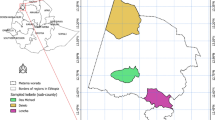Abstract
The sal forest is the only plainland forest in Bangladesh, and is of national economic and environmental importance. High population and ever increasing poverty has stimulated exploitation of the forest alarmingly and brought it near extinction. In facing this situation, the Bangladesh Forest Department implemented a participatory management approach, involving the householders living in and around the forests, for forest maintenance and protection. This study examines the effectiveness of practicing participatory forestry on the settlers’ livelihood in the encorached area of the sal forest. The settlers were given degraded and encroached forest land through the program. Two major social forestry models — namely agroforestry and woodlots — are included in the study. Participation in the resettlement increased household income, employment opportunities and financial and non-land assets. It was found that the participatory management regime could attain the sustainability of the forest and accelerate the standard of settlers’ livelihood, hence the program is an efficient management option towards sustainability of the forest resources. These findings suggest that there is a role for extending the approach to rehabilitate other degraded and encroached forest lands in Bangladesh.
Similar content being viewed by others
References
ADB (Asian Development Bank), (1999), Handbook on the Economic Analysis of Water Supply Projects, Economics and Development Resource Centre, ADB, Manila.
ADB, (2001), Handbook on Integrating Poverty Impact Assessment in the Economic Analysis of Projects, Economics and Development Resource Centre, ADB, Manila.
ADB, (2002), Renewable energy development sector project to the Republic of Indonesia, ADB Report, RPP: INO 34100, Manila.
Ahamed, F. U. (1993), Respondents to environmental degradation: Some implications of a social forestry project in Bangladesh, M. Phil. Dissertation, Cambridge University, Cambridge
Ahmed, A.U. and Azad, A.K. (1987), Social forestry in Bangladesh: a case study of Betagi and Pomora experiments, Bangladesh Centre for Advances Studies (BIDS), Dhaka.
Ahmed, M.R. (2000), Searching for a new paradigm in sustainable forest management: Participatory forest management as a strategy for forest conservation and development in the tropics, Proceedings of XXI IUFRO World congress, Vol.2, International Union of Forestry Research Organizations, Kuala Lumpur.
Alam, R. (1998), Participatory Approach in Degraded Sal Forest in Gazipur District, Review paper, Institute of Forestry and Environmental Sciences, University of Chittagong, Chittagong.
Bartleby, (2004), The World Factbook 2003, Bangladesh, www.Bartleby.com/151/bg.html, accessed 13 August, 2004.
BBS, (2000), Statistical Yearbook of Bangladesh, Bangladesh Bureau of Statistics, Ministry of Planning, Dhaka
Chowdury, R.A. (1994), History and Importance of Sal Forests and Current Management Status, in: Agro forestry for the degraded ‘sal’ forest, Proceedings of national workshop held at Bangladesh Agricultural Research Council, BARC and Forest Department with the financial assistance of APAN, Dhaka.
Coakes, S. J. and Steed, L. G. (2001), SPSS Analysis without Anguish, Wiley, Milton, Australia.
Easton, V.J. and McColl, J. H. (2003), Statistics Glossary V1.1, http://www.cas.lancs.ac.uk/glossary_v1.1/nonparam.html (1 of 5), accessed 23 September 2003.
Norusis, M.J. (1999), Guide to Data Analysis, SPSS 9.0, Prentice-Hall, New Jersey.
Quddus, A.H.G., Ali, S.M.I., Bhuiyan, A.M.A. and Hossain, M. (1992), Greening the Hills: the Betagi-Pamora Agoroforestry Experience, Research Report Series 1, 148 pp. Dhaka: BARC-Winrock International.
Xe, (2004), Currency converter, www.xe.com/ucc/convert.cgi, accessed 29 September, 2004.
Author information
Authors and Affiliations
Rights and permissions
About this article
Cite this article
Safa, M.S. The effect of participatory forest management on the livelihood and poverty of settlers in a rehabilitation program of degraded forest in Bangladesh. Small-scale Forestry 3, 223–238 (2004). https://doi.org/10.1007/s11842-004-0016-z
Issue Date:
DOI: https://doi.org/10.1007/s11842-004-0016-z




